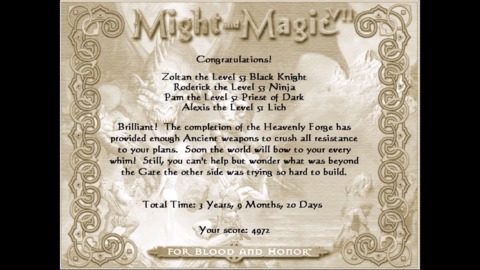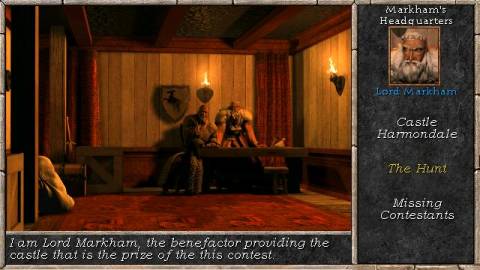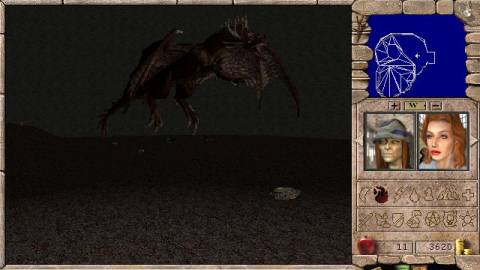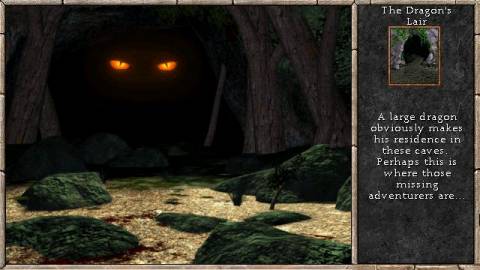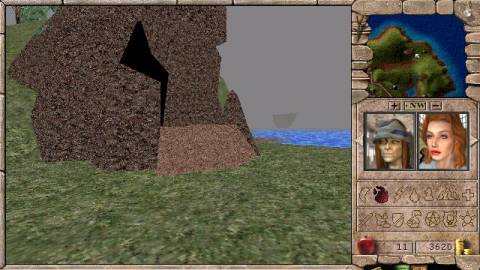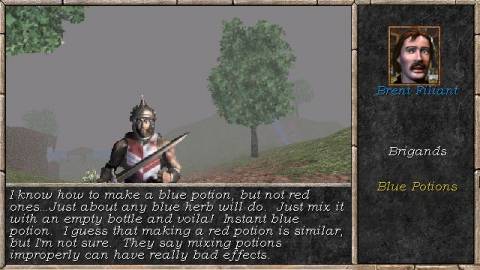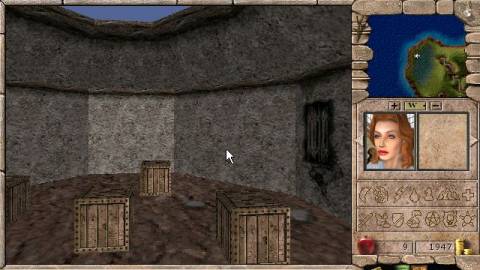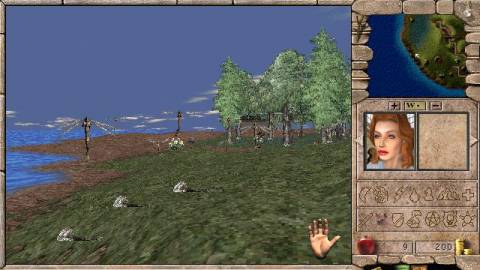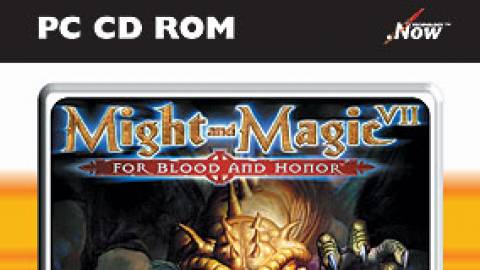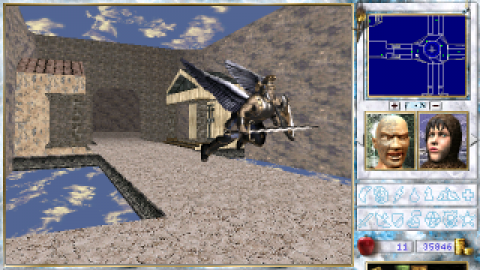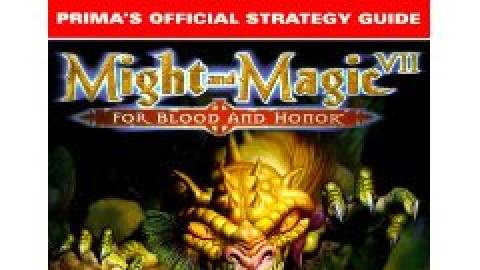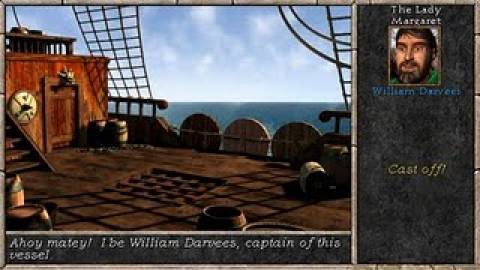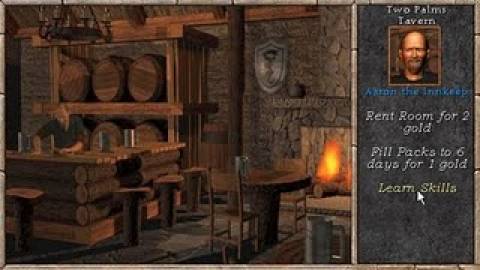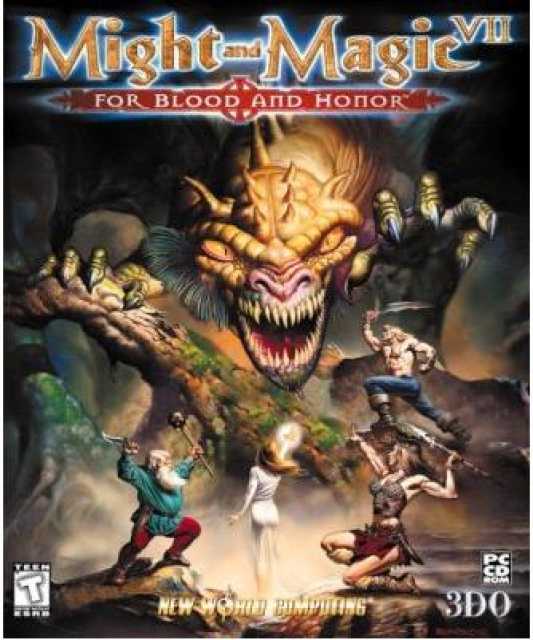Overview

The seventh entry of the Might and Magic series continues to use the same engine pioneered with its predecessor. Despite the heavy redesign that its gameplay would undergo, the basic goals would remain the same as a party-based, open world RPG. Players would continue to seek out out quests, fight terrible creatures, and explore another vast world laid at their feet.
In this game, the players take on the role of those characters that had escaped at the end of Might and Magic III and find themselves on the world of Colony to fight an ancient enemy. Events from that game would also play a part within its backdrop, although players need not have played it in order to understand what was required of them in this iteration.
The Manual was particularly noteworthy for continuing the tradition of providing plenty of expanded fiction encompassing the world of Might and Magic.
As was a tradition of the series, a color map showing the world of Enroth was also provided.
Story
Previous games in the series held back the sci-fi aspect of the game until close to the very end when everything would be revealed, but with Mandate of Heaven, this was introduced somewhat from the start. Players unfamiliar with the extensive backstory of the series, however, could ignore the introductory cutscene and dive into the game suspecting nothing and focus only on the introduction provided by the manual.
At the end of Might and Magic III, the party of adventurers that had ended that quest had piloted a ship called "the Lincoln" in pursuit of both Corak and Sheltem who, in later installments, were revealed to be guardians created by the mysterious Ancients; a super-race of space travelers that had created the worlds of Might and Magic as a means to expand their empire and preserve their race against the vicious predations of their greatest enemies. Corak, a Guardian with good intentions, was sent after another Guardian, Sheltem, who had defied his masters and sought to destroy their works. They do not know that in Might and Magic V, with the aid of another group of adventurers, Corak and Sheltem had ultimately destroyed each other.
Here, the party of eight split into a "good" group and an "evil" one, both exploring the continent of Antagarich with their own agendas. Meanwhile, the mysterious figure of Archibald Ironfist who was seen laughing at the end of Might and Magic VI, the brother of King Roland, had fled the continent of Enroth arriving on Antagarich. Forging an alliance with the Necromancers and eventually becoming their leader, he sets his own plans in motion. Meanwhile, a new party of adventurers take up the challenge of a local lord to win a castle.
Meanwhile, the four "good" characters, led by the Cleric Resurrectra, reach the southern kingdom of Bracada and become advisors of the Immortal King, Gavin Magnus. There, they discover works pointing to an ancient "Gate" left behind by the Ancients allowing them to reach the two warring Guardians (Corak and Sheltem) and perhaps the Ancients themselves. As for the evil characters, they are led by the wicked sorceror, Kastore, and intend to use the same knowledge to recover the Heavenly Forge which was also created by the Ancients. With it, Kastore would be able to create an endless supply of futuristic weapons with which to dominate the world. They quickly become advisors to Archibald Ironfist.
As for the adventurers that win the Lord's challenge and their own castle, they are eventually given the choice to either join Resurrectra and Magnus in restoring the Gate or assist Kastore and Ironfist in their quest for the Heavenly Forge. In a unique twist for an RPG series, the game also ties together events that have come to pass in the Heroes of Might and Magic series as well as several loose threads from Might and Magic VI.
Eventually, Archibald is betrayed by Kastore who attempts to overthrow his position as the Necromancer's leader. Filled with remorse over his past deeds, Archibald contacts the party and offers his aid in rescuing King Roland from the hands of the evil Kreegans who have him captive. The Kreegans are the long standing enemy of the Ancients who have long been fighting a war of survival against them for eons. King Roland's wife, Queen Catherine, has also returned to Erathia and offers her own aid. Eventually, the party find and destroy the Kreegan leader, Xenofex, and reunite the Ironfists. As for Archibald, he renounces his claim to the throne and quietly departs.
Depending on the party's chosen side, there are two endings that play out after the final quest is resolved. The party must return to the Lincoln and retrieve an item called the Oscillation Overthruster which is the vital component needed to either restore the Gate or the Heavenly Forge to working order.
If the party allied with Resurrectra repair the Gate, they are transported to a space station where a second version of Corak awaits them and reveals to them the truth behind the Ancients' war. With the gate at their command, Corak congratulates their efforts and says to them that with it, they may explore countless worlds at their choosing and perhaps discover the Ancients themselves, bringing back the fruits of that meeting to their own civilization.
But if the party presents the Overthruster to Kastore instead, the Heavenly Forge is restored to working order and commits itself to doing what it had been designed to do: create futuristic weapons for war allowing Kastore to reign supreme.
Gameplay
MM7 continues to use the engine developed with MM6 ( Mandate of Heaven) which allows for a free roaming movement system providing complete 360° range of maneuverability similar to that found in titles such as Elder Scrolls: Arena or Daggerfall. It would also use 3D graphics to render the environment of its world although it would also use them in conjunction with animated 2D sprites representing monsters and special effects among other assets. It would also use an extensive number of cut-scenes utilizing rendered FMVs utilizing 3D graphics.
Players were called upon to create a four character party and depending on which class is chosen, they will start with two preset skills with the player free to pick two extra starting skills alongside the available options depending on the character's class. Though each character only starts with four skills, they can always learn any other skills allowed by their class from teachers spread throughout the land.
MM7 added three new classes: the Thief, Monk, and the Ranger. The other six classes are Knight, Cleric, Sorcerer, Paladin, Archer, and Druid, with each being able to eventually perform epic quests to be promoted to greater versions of their starting class. For example, a Knight can earn a quest promotion to become a Champion or, if their alignment is of a darker nature, a Black Knight.
The first set of skills is weapon skills, including Staff, Sword, Dagger, Axe, Spear, Bow, Mace, and Unarmed. Next there are the armor skills, consisting of Leather, Chain, Plate, and Shield. The various schools of magic are Fire Air, Water, Earth, Spirit, Body, Mind, Light, and Dark, though Light and Dark are not available to any class at the beginning.
Finally there are the miscellaneous skills, denoting all skills which do not fit into any other category: Identify, Merchant, Repair, Bodybuilding, Meditation, Perception, Diplomacy, Disarm Trap, and Learning among others. With all skills, characters may eventually find teachers who can teach an upgrade to Expert, Master, and then ultimately, to Grandmaster although this last is far more specific to certain classes. For example, a Knight cannot become a Dodging Grandmaster. That role is reserved for a Monk.
This gameplay system would be used throughout the rest of the series with minor changes between each iteration.
Graphics
Might and Magic VII uses the same engine as its predecessor but with support for 3D acceleration which improves the graphical effects in the environment. Such effects are primitive by today's standards but are better than the 2D sprites used in M&M VI.
Also, the art style was changed to a more fantasy oriented view, instead of the realistic looking portraits found in its predecessor. However, the game was still criticized for looking too much like the previous game in the series.
The Game world is noticeably smaller than in M&M VI and the dungeons are smaller as well. These changes were directed at the criticism of M&M VI's immense late game dungeons and may also be a result of the shorter dev cycle for the game. These things also make the game shorter than M&M VI by a wide margin.
Time
Time is also an important consideration in the game as day and night cycles pass offering new opportunities or in making things more difficult depending on where they are. Several quests in the game are also tied to their own schedule meaning that when an NPC says that they are giving a month to complete a quest, they mean it. This can also determine when the safest time might be for the party to rest and recoup their strength if they are out in the wilderness.
Statistics
The statistics for each character are limited only by the number of levels that they may earn, among other factors such as magical effects, allowing for tremendously high numbers that break the typical "18" cap. However, if any statistic drops to 0, it will result in immediate death for that character.
The basic statistics used in the game seem derived from the Dungeons and Dragons model of statistics, although carry different names so as to differentiate themselves. They are:
- Intellect - General knowledge. Important to sorcerers as it can affect spell points. Important to archers later on at higher levels as they begin learning sorcerer spells.
- Might - Raw strength. Important to any fighting class such as Knights and Paladins. Affects the damage a character can inflict in melee combat.
- Personality - A character's general degree of appeal to others. Particularly important to clerics as it affects their pool of spell points. Important to paladins when, at higher levels, they begin learning cleric spells.
- Endurance - Stamina. Affects how many hit points a character initially has to start with and will gain every time they level. Particularly important to fighters.
- Speed - Agility and general quickness affecting initiative. A faster character improves (increases) their Armor Class rating making them harder to hit.
- Accuracy - A character's ability to land hits during combat. This is particularly important to archers.
- Luck - Measures the general chances of a character succeeding when all else seems to have failed. Random and unpredictable.
Classes
- Knights are the workhorses of the fighting class, coming onto the scene with the largest selection of weapons and armor; in fact, they are able to eventually learn any and all weapon and armor skills. Knights begin with the greatest number of hit points of any class and gain the most hit points when they advance in level. Knights can be promoted to Cavalier status (gaining two hit points per level) and again to become an all-out Champion (gaining another two hit points per level) or a foul Black Knight. Being the quintessential warriors, knights have no mind for magic, and so may never learn spells or the Meditation skill.
- Clerics are adventurous, spell-casting holy men who are mediocre fighters. Their magic is most powerful in the areas of healing and defense. Clerics can learn from the mirrored paths of the Light and Dark magics, and the awesome spells available in those realms. For weapons, however, Clerics can only choose the mace, staff, or bow, though they are able to learn all armor skills except for Plate. With much diligence and study, Clerics can ascend to Priest (gaining one hit point and spell point per level), and eventually Priest of the Light (gaining another spell point and an extra hit point) or a nefarious Priest of the Dark.
- Sorcerers are students of Elemental magic, concentrating on offensive and utilitarian magic. Downright rotten fighters, they are barely able to use the dagger, the staff, or the bow effectively, and may not even attempt to use any other weapon types. Forbidden all armor skill but leather, they also have the lowest hit points of all classes. Despite these shortcomings, Sorcerers command tremendous offensive spells, and also have access to the paths of Light and Dark magic, the most powerful wizardry in the land. With much spell casting experience, Sorcerers can be transformed into Wizards (gaining one hit point and one spell point per level) and then to Archmages (gaining another spell point and another hit point) or as a wicked Lich.
- Paladins cross the line between Knight and Cleric, performing both roles well, though not as well as either of the more focused classes alone. Like Knights, Paladins can learn to use any type of weapon or armor; they simply don't have as many choices to begin with. Paladins begin with the Spirit realm of magic, and can later learn to use the Clerical Mind and Body realms. They are, however, restricted from learning the powers of the realms of Light and Dark, as well as the Elemental magics. Paladins who remain true to their cause may achieve the rank of Crusader (gaining one hit point and one spell point per level) and ultimately ascend to Hero (gaining another hit point and spell point per level) or as a Villian.
- Archers are another type of hybrid, in this case between Knight and Sorcerer. Archers may learn to use any type of weapon, although their specialty is the bow. Their discipline prevents their use of shield or plate armor. An Archer's talent for spell-casting begins with the Air realm of magic, and may eventually grow to take in all the Elemental Realms. the realms of Light and Dark magic, however, are beyond their grasp. Archers can focus themselves to become Battle Mages (gaining one hit point and one spell point per level), and eventually may aspire to Warrior Mages (gaining another hit point and spell point per level) and then either a Master Archer or an evil Sniper.
- Druids combine the best of Sorcerer and Cleric classes. They have few hit points, and make poor fighters; their arsenal is limited to staff, dagger, and bow, and their armor is limited to leather and shield. On the plus side, they can build a heck of a circle or rocks, and can use both Sorcerer and Clerical magic: that unique mix allows them to cast certain spells no other class can. They cannot, however, learn Light and Dark magic. To make up for that, Druids may begin their Apprenticeships with the Learning skill. A Druid can grow to become a Great Druid (gaining one hit point and one spell point per level) and eventually to an Arch Druid (gaining another spell point and another hit point per level) or a Warlock (evil aligned Arch Druid).
- Thieves are decent fighters and expert robbers with their ability to steal from others. They do not have as many hit points as a pure fighter would, such as a knight, and are restricted to smaller weapons and lighter armor such as a dagger and leather, respectively. However, they are the only class that can master the tricky art of disarming traps and finesse their way through battle with a smattering of spells at higher levels of promotion. They can earn such promotions to become a Rogue with increased hit points and then eventually choose to become either a Spy or an Assassin (both earning spell points that can be used with Fire, Water, Air, or Earth spells).
- Monks are expert fighters that can only use swords, staves, spears, daggers, bows, or their bare fists. However, they can also become Grandmasters of the Staff as well as at the Unarmed skill becoming nigh impossible to hit in combat while being able to pick and choose where their weapon strikes will land. Monks also learn some spell ability at the higher levels of promotion past Initiate and can become either a virtuous Master or a deadly NInja.
- Rangers are tough fighters well versed with wilderness tactics, such as using an Axe to deal the most damage to their enemies. They can use every weapon out there with a decent level of skill, armor up to chain, and can learn most magical skills to Expert level. With more experience and with the proper quest, they can earn a promotion to become a skilled Hunter and beyond that, as a respected Ranger Lord or an infamous Bounty Hunter.
Skills
Each character starts out with a set of four skills and can learn whatever else they wish throughout the game as long as they can pay for the lessons. Skill levels can be improved through a combination of of promotions to their class and then finding the appropriate teacher to earn a higher skill level. In addition, the skill system has been altered from the previous game so that certain classes can only learn certain levels of skills and a new level of Mastery (Grandmaster) for each skill. A similar thing also changed with the magic system where a character could only learn a spell if they had the mastery. For example, only a character with an appropriately promoted Thief class (such as an Assassin) could become Grandmasters of the Dagger.
Weapon Skills
These are required to wield particular weapons. Without the appropriate skill, a character cannot equip specific weapons.
- Staffs are two-handed poles equally good for offense and defense. Expert ranking with the staff will increase the character's armor class and Master ranking will allow them to occasionally stun their opponents. Grandmasters can use a staff in conjunction with their Unarmed skill becoming even deadlier in battle.
- Sword skill covers most types of blades longer than a knife. Expert swordsmen gain a quicker attack while Master swordsmen may wield any one-handed sword in their left hand and another weapon in their right. Grandmasters add their skill level to their armor class.
- Daggers don't do the kind of damage that a sword or an axe can deliver, but their quick attacks can sometimes let a character get in two slices for every one move made by a slower opponent. Expert dagger fighters can wield a dagger in their left hand while using another weapon in their right. Master dagger fighters have a chance of killing a surprised opponent with a single blow. Grandmasters add 1 point of skill to the damage done.
- Axes are rather slow on the attack, but do a lot of damage when they hit. Expert axe fighters gain more speed in their attacks while Master axe fighters can deliver tremendous damage. Grand Masters can even halve the armor class of their opponents inflicting even worse damage to their foes.
- Spears make their point by including all pole weapons with blades attached to the business end. Versatile, they can be used one- or two-handed, but they work better with two hands. Expert ranking with the spear will increase a character's armor class, and Master ranking will boost damage caused. Grandmasters can also use their level to add to their defensive bonus.
- Bow skill targets both bows and crossbows. Expert marksmen gain a speed increase with their weapon, while Masters fire two arrows with every attack with Grandmasters adding their level of skill to the damage caused.
- Mace skill covers all blunt trauma weapons: batons, flails, the general whack-in-the-head arsenal. Expert mace swingers do extra damage with their weapons, while Masters and Grandmasters can stun opponents.
- Unarmed is applied when a character has no equipped weapon and have only their fists to defend themselves with. At the normal level of expertise, the skill level is added to the attack bonus. Experts can then add it to their attack damage. As a Master, it will affect the attack bonus and the damage inflicted. And Grandmasters gain a percentage based on their skill level to completely avoid attacks.
Armor Skills
Note: all armor types (not counting shield) carry a penalty by slowing down a character; Master and Expert kill in armor reduces this drag while the Grandmaster levels add powerful bonuses to their use.
- Leather armor is the lightest armor available. Providing less protection than chain or plate armor, it also slows a character down the least.
- Chain armor provides more protection than leather and less than plate; thus, it also slows a character down more than leather.
- Plate armor delivers the most gong for your gold: it affords the most protection, it also the greatest reduction in speed.
- Shield skill directly improves a character's armor class while a shield is equipped. Expert and Master shield ranking increase this defensive bonus.
Magic Skills
Note: Expert and Master ranks in the various Magic skills have different effects for each individual spell of that Magic school and Grandmaster levels of these spell schools grant devastating bonuses.
- Fire magic is a good way to burn a bad guy, and also includes sells having to do with speed and pain.
- Air magic tends to be defensive and informational in nature, and includes spells of accuracy and flight.
- Water magic is equally useful for defense and offense, and concentrates on spells that move or change things.
- Earth magic is defensive and includes spells that protect, bind, and strengthen.
- Spirit magic concentrates on spells of life and death. Live forever, bring back the dead, slow or accelerate aging.
- Body magic cures disease, dissolves poisons, and generally heals and enchants.
- Mind magic chars and confuses.
- Light magic includes some of the strongest spells in the land. Light magic cannot be chosen by beginning characters; it must be learned and mastered during your travels.
- Dark magic comprises some of the most powerful magic in Enroth. Spells of darkness can have spectacular results, but generally carry a price. Dark magic cannot be chosen by beginning characters; it must be coveted and invoked during your travels.
Miscellaneous Skills
- Identify Item gives meaning to items and equipment; you can't use something until you know what it is! This skill will automatically identify an item if your character's skill level is high enough. Special items may need an Expert or Master in this skill to properly identify them. Grandmasters have seen everything and can deduce what an item is blindfolded.
- Identify Monster allows a character to correctly assess just what it is they are fighting. At higher levels, they will learn more about their quarry such as how many hit points they have and, at Grandmaster, can determine a monster's spell ability, resistances, and attack qualities at a glance.
- Merchant skill helps adjust prices in your favor, whether buying or selling. Remember: buy low, sell high.
- Repair skill allows your characters to fix broken equipment. The higher the skill level, the better the quality of item your character can play handyman on. Expert and master rankings allow characters to repair complex items and artifacts.
- Bodybuilding skill pumps your character up, adding hit points directly to totals.
- Meditation adds spell points directly to your relaxed character's totals.
- Perception sharpens your character's chance of noticing a trap: catch it in time, and the damage it causes can be reduced or even avoided. A higher perception skill equals a chance to escape stronger escapes; Expert and Master rankings allow a character to notice and escape different types of traps.
- Armsmaster increases a character's skill across their weapon abilities. Normal level reduces the time it takes to strike again, Experts and Masters add their skill levels to their damage, and Grand Masters double their previous bonuses.
- Disarm Trap skill is the perfect thing for when you can't remember where you left your keys: all chests will open automatically, but you may get hit by a trap. The more skill you have, the better your chance to disarm any trap before it goes off.
- Learning skill increases the experience your character receives. Every rank of skill increases the experience bonus your character receives. Experts double and Masters triple this bonus; learn enough to do the math and you'll see how this can add to your advantage.
Spells
Each of the various schools of magic have their own unique spells. Spells can have all types of wildly varying effects, from simply lighting a dark hallway to calling down a cataclysmic storm of meteors on everybody in the vicinity! Here is a list of all the spells arranged by school, with descriptions of their effects and the bonus gained from Expert and Master ranking in the relevant Magic skill.
With the improvements made to the skill levels of the classes involved, spells have also been divided into sections available only to those expert enough to gain access to them.
Fire Spells
Normal Level Spells
- Torch Light produces a sphere of light around your party. It only works indoors. Use it for those dark caverns where something might be waiting!
- Fire Resistance increases all your characters' resistance to fire
- Fire Bolt launches a burst of fire at a single target. Costing 4 points, it takes a while to rebuild strength and use it again.
- Fire Aura Causes a weapon with no special abilities to burn with magic fire.
Expert Level Spells
- Haste reduces recovery time for party actions. Beware, for characters will be weak for six hours after this spell wears off. it costs 5 points to cast, and requires recovery.
- Fireball targets a single monster, but explodes to hurt anyone else caught in the blast. What a show! But keep your party at a distance; if they stand too close, they will be hurt as well. This one costs 8 spell points, and takes some time to recover.
- Fire Spike creates a dropped fire spike on the ground that detonates when a monster passes nearby. A Maximum of five of these can be active at any time until the party leaves the map area. It causes 6 points of damage plus 1 additional damage point for every skill rank. Masters can drop seven spikes and increase the damage they do while Grand Masters can use nine of these with even more damaging effects.
Master Level Spells
- Meteor Shower summons 8 flaming rocks from the sky in a 10-foot radius surrounding your target. Unless you're eager to visit a healer yourself, try not to be near the victim when using this spell. Cost is 20, with a period necessary to recoup energy. It happens instantly, and each rock delivers 8 points of damage plus 1 additional for every skill rank. Masters are ready again more quickly with 16 rocks. Grand Masters bring 20 rocks to the party. This spell cannot be used indoors. Obviously.
- Immolation surrounds the party in fire that only hurts anyone else that comes too close with damage equal to the caster's skill level. Experts' recovery time is cut somewhat, while Masters take just a quick breather between spells.
Grand Master Level Spell
- Incinerate is one of the strongest direct damage spells you may acquire, inflicting massive damage on a single target. Only the strongest of monsters can expect to survive this spell. (But if one does, then it's you who has to survive!) Spell point cost is 30, recovery is necessary. It happens instantly, searing 15 points of damage, plus 1 - 15 points extra for each rank of the caster's skill.
Air Spells
Normal Level Spells
- Wizard Eye reveals the locations of monsters and characters on your group's automap. It lasts for 1 hour and it costs one spell point to cast. Experts and Masters will learn more on casting this spell than an Apprentice. Grand Masters pay nothing in spell points to cast this.
- Sparks fires three small balls of lightning that bounce around until they hit something or dissipate. Experts recover more quickly, and fire 5 balls. Masters are ready to go again even faster, with 7 shots. Grand Masters bring nine sparks to the fight.
- Feather Fall slows the speed of a fall and prevents your party from being hurt when falling more than ten feet. The cost for this spell is 5 points, and recovery takes time. It lasts for 5 minutes for every Air magic skill rank. Experts get the duration up to 10 minutes per skill rank, while Masters rate 1 hour per skill rank. Grand Masters recover the fastest.
- Air Resistance increases all character's resistance to air magic per skill point (also affecting duration).
Expert Level Spells
- Shield slows missile attacks (such as rocks and arrows) and cuts their potential damage by half. A Shield costs 8 spell points, and be careful where you use it, as it takes time to recover. It lasts 5 minutes for every skill rank. Experts' Shields last 15 minutes per skill rank, while a Master's version affects the entire party.
- Lightning Bolt discharges electricity from the caster's hand to a single target. It always hits and does solid damage. It costs 10 spell points. It fires instantly, doing 1 - 8 points of damage for each skill rank. Experts recover more quickly, Masters faster still.
- Jump launches your party into the air at a forty-five degree angle, landing them without damage a set distance away. It costs the caster only 15 spell points and higher skill will reduce recovery time. Experts and Masters recover more quickly.
Master Level Spells
- Implosion is a nasty spell that affects a single target by destroying the air around it. The result is a sudden inrush from the surrounding air, a thunderclap, and 10 points of damage plus an extra 1 - 10 points of damage for every skill rank. It costs 20 points to cast, and rest is required afterwards. Experts are back to readiness more quickly, Masters faster still. Grand Masters sigh before doing it again.
- Fly grants the power of flight to your characters, 5 minutes airborne for every skill rank! Only available outdoors, Fly initially costs 25 spell points and slowly drains spell points as it remains active. Be careful not to fall from a great height! Experts can stay up for 10 minutes per skill rank, while Masters wing it for an entire hour per skill rank. Grand Masters do it for free.
- Invisibility makes the party invisible.
Grand Master Level Spell
- Starburst calls 8 stars from the heavens to smite and burn your enemies in a 20-foot radius. Try not to get caught in the blast! Cost is 30 spell points, recovery is very significant, each stars' damage is 20 points plus an extra 1 point of damage for every skill rank. Experts reduce their recovery somewhat and get 12 stars; Masters turn back their recovery even more, and deliver 16 stars. It only works outdoors.
Water Spells
Normal Level Spells
- Awaken automatically awakens all of your characters from a normal sleep and dramatically reduces the duration of sleep spells cast on your characters.
- Protection from Cold increases all your characters' resistance to Cold: 1 point of resistance for every rank the caster has in Water magic. Cost is 3 points, recovery is required. The Protection lasts for 1 hour per skill rank. Experts double the resistance, while Masters triple it.
- Poison Spray sprays 1 shot of poison at monsters directly in front of your characters. Damage is low, but few monsters have resistance to poison, so it's an easy way to make 'em suffer. Cost in spell points is 4, recovery is required. The effect is 2 points of damage, plus an extra 1 - 2 points of damage for every skill rank. Experts recover more quickly and fire 3 shots. Masters are back at it faster with 5 shots.
- Ice Bolt fires a single bolt of ice at a single target. Always a hit, it does moderate cold damage: 1 - 7 points of damage per skill rank. Cost is 8. Experts and Masters recover more quickly.
Expert Level Spells
- Water Walk lets your characters walk along the surface of water without sinking, for 5 minutes for every skill rank. Only useful outdoors, this spell costs 5 spell points initially, but you should never forget that this magic constantly drains spell points while active. Experts stay topside for 10 minutes for every skill rank, Masters are afloat for 1 hour per skill ranking. The spell drain is the same no matter what level the caster is.
- Recharge Item will attempt to make recharge a magic item. The limit of charges in an item recharged this way will drop a certain percentage depending on mastery and the number of charges restored is based on the same.
- Acid Burst targets a single monster with an acidic bolt that does 9 points of damage plus 1 - 9 points per kill rank in Water magic.
Master Level Spells
- Town Portal transports the party to the last town they visited. At Apprentice level it only works outdoors. As a further caution, the chance of Town Portal working is rather small, improved by your rank of Water magic skill. Cost is 25 and recovery is slow. Experts can use this spell indoors, and Masters can choose the town.
- Ice Blast fires a ball of ice in the direction the caster is facing. The ball will shatter when it hits something, launching 7 shards of ice in all directions except the caster's. Shards will ricochet until they strike a creature doing 12 points of damage plus 1 - 2 points per rank of Water magic skill, or melt. Beware that the ricochet can hit your party, even when the shards don't start out in their direction. It costs 25 points, and requires recovery time, which is less for Experts, Masters, and Grand Masters.
- Enchant Item enchants a normal item with magical powers. Chance of success it 10% per point of the caster's Water Magic skill.
Grand Master Level Spell
- Lloyd's Beacon lets you place one marker at a location you want to teleport back to in the future. Just how far in the future depends on your skill and ranking in Water magic; the marker decays in 1 week times a character's skill rank.
Earth Spells
Normal Level Spells
- Stun slaps a monster with magical force, forcing it to recover from the spell before it can do anything else. It also knocks monsters back a little, giving you a chance to get away while the getting is good.
- Slow halves the movement speed and doubles recovery time for a single target creature. Duration is 3 minutes per point of the caster's Earth Skill.
- Earth Resistance increases all your characters' resistance to earthy magic: 1 point of resistance for every rank of the caster's Earth magic skill. Cost is 3 points, recovery is required.
- Deadly Swarm summons a swarm of biting, stinging insects to bedevil a single target. Moderate in its damage, the swarm nonetheless never misses and the damage is physical, making resistance unlikely.
Expert Level Skills
- Stone Skin increases the armor class of a character by 5 for 4 minutes, plus an extra five minutes for every skill rank. Cost to cast is 5.
- Blades fires a rotating, razor-thin metal blade at a single monster. This spell can miss: the chance it'll even hit relies heavily on the caster's rank of Earth magic skill. Cost is 8 spell points and requires recovery. Damage is 1 - 5 points for every skill rank.
- Stone to Flesh, if cast in time, removes tthe curse of being turned to stone from a character. The caster's skill and rank in Earth magic determine how long the dire condition can be present before the spell loses effectiveness. After that, the only way to remove the condition short of Divine Intervention is to visit a temple.
Master Level Spells
- Rock Blast releases a magical stone into the world, a stone that will explode either when it comes into contact with a creature or when enough time passes, causing damage in a radius of 20 feet. The rock will bounce and roll until it finds a resting spot. Be careful; anyone can be caught in the blast.
- Telekinesis allows the caster to manipulate objects at a distance.
- Death Blossom fires a magical stone far into the air, causing a very powerful explosion with a radius of 40 feet when it lands. This spell can only be used outdoors, costs 25 points, and requires time to recover. Damage is 20 points, with an extra 1 point for every skill rank.
Grand Master Level Spell
- Mass Distortion increases the weight of a single target enormously for an instant, causing significant internal damage equal to 25% of the monster's hit points plus another 2% per rank of Earth magic skill. The bigger they are, the harder they fall. Spell point cost is 30, and is very tiring.
Spirit Spells
Normal Level Spells
- Detect Life you to see the health points of opponents.
- Bless characters to increase their chance of hitting monsters in hand-to-hand combat and with missile weapons.
- Turn Undead forces all undead monsters in sight of the spellcaster to flee. They'll be back when the spell runs out: 3 minutes, plus an extra 3 minutes for every skill rank. Cost for this scattering is 15. Experts and Masters will recover faster.
- Fate improves a character's chance to hit.
Expert Level Spells
- Remove Curse, if cast in time, removes a curse from a character. The caster's skill and rank in Spirit magic determine how long the dread condition can be present before the point of no return. After that, the only way to remove the condition short of Divine Intervention is to visit a temple.
- Heroism increases by 5 the damage that a character does with a successful attack. This costs 10 spell points, and the caster must rest; it lasts for 4 minutes, with an extra 5 minutes for every skill rank. Experts get an extra 15 minutes for every skill rank, Masters affect all the characters in your party.
- Preservation protects a character's soul by binding it tightly to their body in the hope of providing complete protection against instant death and eradication abilities.
Master Level Spells
- Raise Dead, if cast in time, restores a character to life. the caster's skill and rank in Spirit magic determine how long the character can be worm food before the point of no return. After that, the only way to revive the corpse short of Divine Intervention is to visit a temple. Raised characters will be weak unless treated or sufficiently rested.
- Shared Life combines the life force of your characters and redistributes it between them as evenly as possible. All current hit points are totaled, and 1 extra hit point is added for every skill rank.
- Spirit Lash damages a creature by attempting to sever its link between body and soul.
Grand Master Level Spell
- Resurrection, if cast in time, removes the eradicated condition from a character. The caster's skill and rank in Spirit magic determine how long the character can be dead before the point of no return.
Mind Spells
Normal Level Spells
- Remove Fear removes the fearful condition from a character if this spell is cast in time. The caster's skill and rank in Mind magic determine how long the character can be paralyzed by fear before the point of no return.
- Mind Blast fires a bolt of mental force guaranteed to hit any target and damage that monster's nervous system. Expect 5 points of damage, with an extra 1 - 2 points for every skill rank. Cost is 3 spell points, recovery time is moderate. Experts and Masters are progressively faster to recover.
- Mind Resistance improves a character's resistance to mind altering spells.
- Telepathy reads a target's mind to find out just what they have in their pockets.
Expert Level Spells
- Berserk causes the targeted creature to completely nuts and attack the nearest target, whether they are friend or foe.
- Cure Paralysis, if cast in time, removes paralysis from a character. The casters skill and rank in Mind magic determine how long a character can be immobile before the point of no return.
- Charm calms a single targeted creature and removes any hostile feelings it has towards your characters, an effect that lasts 3 minutes for every skill rank.
Master Level Spells
- Mass Fear causes all creatures in the spellcaster's line of sight to flee in fear, a cowardly condition lasting 3 minutes for every skill rank.
- Cure Insanity removes the taint of insanity from a character if this spell is cast in time. The caster's skill and rank in Mind magic determine how long a character can be whacko before the point of no return.
- Psychic Shock targets a single creature with mind-damaging magic: 12 points of damage, plus an extra 1 - 12 points for every skill rank. Recovery time depends on your level of expertise; Experts and Masters have the advantage.
Grand Master Spell
- Enslave attempts to take control of the target creature for ten minutes per the caster's Mind Magic skill. Very useful in crowded situations.
Body Spells
Normal Level Spells
- Cure Weakness, if cast in time, removes weakness from a character. The caster's skill and rank in Body magic determine how long a character can be debilitated before the point of no return.
- Heal restores lost hit points to a single target.
- Body Resistance increases all of a character's resistance to Body Magic per a degree of time determined by the caster's skill level.
- Harm slams a single creature with completely reliable magical damage.
Expert Level Spells
- Cure Poison, if cast in time, removes the toxic condition from a character. The skill and rank in Body magic determine how long a character can be poisoned before the point of no return.
- Regeneration helps a character heal over time while the spell is active.
- Hammerhands enhances the skill of an unarmed combatant.
Master Level Spells
- Cure Disease, if cast in time, removes the diseased condition from a character. The caster's skill and rank in Body magic determine how long a character can be infected before the point of no return.
- Protection from Magic grants some immunity to attack effects that cause debilitating conditions such as poison, stoning, or paralysis.
- Flying Fist cannot miss and it pummels an opponent with 30 points of damage, plus an extra 1 - 5 of damage for every skill rank.
Grand Master Level Spell
- Power Cure restores hit points to all characters in your party at once.
Light Spells
Normal Level Spells
- Dispel Magic removes all helpful spells on all monsters in sight.
- Destroy Undead only works on those blasphemies, calling upon the power of the Gods to undo the evil magic that extends their unnatural lives.
- Light Bolt fires a bolt of light at a target. Wicked good.
Expert Level Spells
- Day of the Gods boosts all of a character's attributes by 10 along with a bonus of 3x the caster's Light Magic Skill.
- Summon Elemental brings forth an elemental of light to fight for the party.
Master Level Spells
- Prismatic Light can only be cast indoors, and inflicts damage on all creatures in sight: 25 points of damage with an extra 1 point for every skill rank.
- Hour of Power simultaneously casts Haste, Heroism, Shield, Stoneskin, and Bless on all your characters, adding twice the spellcaster's Light magic skill to their statistics.
- Sunray is the second most devastating spell you may acquire. Harnessing the light of the sun and concentrating it on one pathetic creature.
- Day of Protection simultaneously casts Protection from Magic, Air, Body, Earth, Fire, Mind, and Water along with Feather Fall and Wizard Eye.
Grand Master Level Spell
- Divine Intervention calls upon the heavens to heal your characters of all damage, restore your spell points, and remove all adverse conditions. May only be cast three times per day and ages the caster by ten years. Is possible to die from casting this spell too much.
Dark Spells
Normal Level Spells
- Reanimate will allow the caster to "raise from the dead" any monster or NPC, depending on their original hit points and the caster's skill in Dark magic.
- Toxic Cloud creates a poisonous cloud of noxious gases in front of the spellcaster and sends it slowly away from your characters.
- Vampiric weapon enchants a weapon with vampiric ability.
- Shrinking Ray reduces the size of the target monster.
Expert Level Spells
- Shrapmetal fires a blast of hot, jagged metal in front of the caster, striking any creature that gets in the way and inflicting serious damage.
- Control Undead takes control of the undead for a time.
- Pain Reflection reflects damage inflicted on the target back onto the offending monster.
Master Level Spells
- Sacrifice slays a single NPC hireling tagging along with the party, restoring the caster to full health and spell power.
- Dragon Breath is the most powerful damaging spell you may acquire. It empowers the spellcaster to exhale a cloud of toxic vapors that targets a single monster, but also damages all other creatures within a 10-foot radius. Cost is 100, delivering 1 - 25 points of damage for every skill rank. Recovery time is significant, but less for Experts and Masters.
- Armageddon is the town killer, inflicting 50 points of damage plus 1 point of damage for every rank of Dark skill your character has to every creature on the map, including all your characters. It can only be cast once per day, and only outdoors, without cost in spell points. Quite exhausting, really. Experts can use Armageddon twice per day, while Masters can unleash it 3 times in one 24-hour period
Grand Master Level Spell
- Souldrinker sucks life from all creatures in sight and transfers them to the party in the form of hit points.
Combat
Battle is in real-time although a turn-based approach to fighting the enemy can also be activated allowing for a pause after every action. Each character moves at their own individual pace. After their initial action, a short amount of time must pass before they are ready to strike the enemy or cast another spell. Various factors can affect their recovery speed such as whether the party is moving onscreen or if they simply inherently slower due to their statistics.
Equipping characters is easily done from the inventory screen showing both what is in their individual pack and their "doll" as represented on the right of the screen, similar to the paper doll system utilized by Ultima VII. Depending on a character's skill set, dual wielding was even possible allowing a Master Swordsman to wield two blades at once.
The use of missile weapons in the game which range from simple bows and arrows to futuristic blasters coupled with the real-time combat system can give the later game the impression of being a crude FPS thanks to the fact that enemies are always visible onscreen.
GoG Release
The game was recently re-released on GOG, which will allow the game to be played on modern machines, as the game was designed to be played on nothing above Windows 98.

 PC
PC
